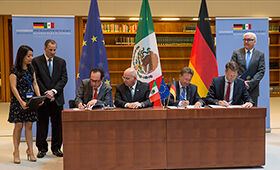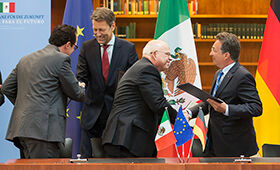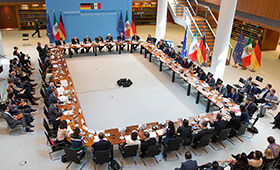New alliance in German-Mexican vocational education and training cooperation
Germany and Mexico have signed a “Joint Declaration of Intent” on cooperation in vocational education and training. Both sides agreed on the intensification and further development of their work together. In future, the German stakeholders will be offering their advisory services “from a single source”.

On 9 June 2015, the governments of the Federal Republic of Germany and Mexico signed a “Joint Declaration of Intent” on cooperation in vocational education and training. Both sides agreed to intensify and to continue to develop the work they undertake together. In future, German stakeholders will be orchestrating the consultancy services they offer in Mexico in order to be able to deliver these in a coordinated manner and “from a single source”.
Both governments have committed to contribute equal shares to a total funding volume of €10 million in order to develop the “Mexican model of dual vocational education and training (MMFD)” and thus continue to pursue this joint initiative between the state and the private sector in a systematic manner. The term of the cooperation agreement will be three and a half years.
The Federal Ministry of Education and Research (BMBF) and the Federal Ministry for Economic Cooperation and Development (BMZ) anticipate that this VET policy cooperation will deliver an impetus for collaboration with the whole of Latin America.
The aim is to bring about a sustainable strengthening of training in Mexican companies and vocational schools by structuring it in a requirements-oriented and practically related way. The government representatives emphasised the fundamental importance of close cooperation between all stakeholders if these objectives are to be achieved.
On the German side, the German Office for International Cooperation in Vocational Education and Training (GOVET) and the Federal Institute for Vocational Education and Training (BIBB) are joining forces with the German Agency for International Cooperation (GIZ) to provide consultancy services in Mexico within the field of vocational education and training.

The signing of the Declaration of Intent took place at the Federal Foreign Office during a meeting of the German-Mexican Binational Commission. The session was chaired by the German Foreign Minister Frank-Walter Steinmeier and his Mexican counterpart José Antonio Meade Kuribreña and was staged under the motto of “An Alliance for the Future”. The signatories for the German Government were State Secretaries Georg Schütte from the Ministry of Education and Research (BMBF) and Friedrich Kitschelt from the Federal Ministry for Economic Cooperation and Development (BMZ). Juan Manuel Valle, Managing Director of the Mexican Agency for International Cooperation and Development (Foreign Ministry) and State Secretary Rodolfo Tuíran from the Mexican Ministry of Education (SEP) signed on behalf of the Mexican Government. State Secretary Schütte expressly welcomed the concept that had been drawn up for the cooperation project aimed at the further development of the MMFD.
Expansion of dual vocational education and training in the key country of Mexico
Mexico has a population of approximately 120 million and is a key economic location for Germany. At the same time, Germany is Mexico’s most important trading partner in the EU. Around 1,400 companies with German capital investment are registered with the Mexican Ministry of Economics. These are mainly concentrated in the automobile and automotive supplier industries, in the pharmaceutical and chemical sectors and in the logistics branch.
The German Federal Government has been supporting the process of the introduction of the MMFD in eleven federal states since the beginning of 2014. The aims for 2015 are to extend the MMFD to six further federal states, to enhance the model in qualitative terms and to increase the number of dual training courses. The Joint Declaration of Intent sets out plans for successive cooperation in the following fields of activity.
- Creation of the strategic and regulatory foundations of the MMFD
- Improvement of the quality of dual training in selected specialisms
- Improvement of the organisation and management of dual vocational education and Training
- Strengthening of capacities and personal effectiveness of the stakeholders within the MMFD
BIBB will concentrate its advisory services on the first two of these fields. It will deploy experts to provide technical support for the establishment of an institutional and legal framework for dual VET. Further development of company-based training standards on the basis of the training occupations of vehicle mechatronics technician and skilled transport employee will form another main thematic focus.
The aim for the end of 2015 is for 3,000 Mexican trainees to have undergone dual training across the country and for dual training to have been cast into a legislative mould in the form of a ministerial communiqué.

Immediately following the signing of the “Joint Declaration of Intent”, State Secretaries Schütte and Tuíran formally convened the inaugural meeting of the German-Mexican Working Group for Vocational Education and Training at the BMBF. This binational steering committee discussed future cooperation instruments and defined roles and tasks for the participating stakeholders.
The representatives from both sides agreed that successful operational implementation of the goals of the MMFD depends on long-term commitment from all stakeholders. The German-Mexican Chamber of Foreign Trade (CAMEXA) on the German side and the Mexican National College of Technical Professional Education (CONALEP) and the Mexican Employers’ Association (COPARMEX) on the Mexican side will all have important parts to play. The German Embassy in Mexico will also be systematically promoting the advantages of dual VET at a series of bilateral events. Ambassador Viktor Elbling spoke of a “key to Mexico’s social engine”.
The Working Group resolved that the next cooperation measure would be the further development of competence standards in the occupational fields of “industrial mechatronics”, “information technology”, “tourism” and “the hotel and restaurant trade”. In addition to this, a further objective is to drive forward the Mexican vocational education and training system in the areas of “green skills” and “vocational orientation”. The plan is for vocational orientation schemes to provide advice on making the transition from school to work to young people who cannot be integrated into dual forms of training.
Previous milestones in bilateral cooperation
March 2009: Signing of a cooperation agreement between BIBB and CONALEP
July 2013: Establishment in Mexico of the „Comité Técnico“, comprising representatives of the Mexican Ministry of Education (SEP), the Mexican Employers’ Association (COPARMEX), CONALEP and the German-Mexican Chamber of Foreign Trade (CAMEXA).
February – October 2014: Joint fact-finding missions and scrutiny visits undertaken by BIBB and the GIZ
February 2014: Launch of the “Dual Vocational Education and Training Initiative” by the German Embassy in Mexico in conjunction with BIBB, the GIZ and CAMEXA
August 2014: Signing of an agreement between the Mexican Ministry of Education and the Mexican Employers’ Association (COPARMEX) on the joint introduction of the MMFD as a new educational and training pathway in Mexico